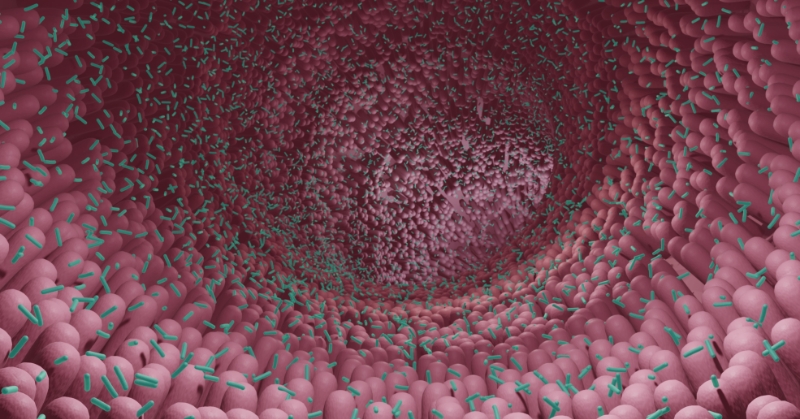Findings may yield insights into preeclampsia, other disorders involving the placenta

Bacteria in the maternal digestive tract appear to stimulate blood vessel development of the placenta, suggests a mouse study funded by the National Institutes of Health. In a series of experiments, researchers showed that female mice deprived of digestive tract bacteria produced fetuses with undersized placentas that had underdeveloped blood vessels. Similarly, when treated with metabolites—by-products made when the bacteria feed on carbohydrates in the digestive tract—lab cultures of human placental cells produced cell networks similar to early-stage blood vessels. The authors concluded that studying the relationship between the mother’s microbiome and placental development may yield important insights into fetal and maternal health.
The study was conducted by Geoffrey N. Pronovost, a doctoral candidate at the University of California in Los Angeles, and colleagues. It appears in Science Advances. NIH funding was provided by the Eunice Kennedy Shriver National Institute of Child Health and Human Development.
Background
Previous studies in mice have found links between the maternal microbiome and development of macrophages (a type of immune cell) in the fetal brain and the development of the fetal nervous system.
For the current study, researchers sought to determine if microbes that colonize the digestive systems of female mice might influence the development of the placenta during pregnancy. They devised a series of experiments comparing placental development in the fetuses of mice with intact microbiomes to those without them.
Results
Mice without a gut microbiome had fetuses with placentas that weighed less than fetuses of mice with intact microbiomes. Further examination revealed that the placentas from the microbiome-deprived mice were not only smaller but had less volume in the placental labyrinth—the series of blood vessels and cavities where maternal blood pools to supply the fetus with nutrients and oxygen. Similarly, fetuses of the microbiome-deprived mice were smaller than fetuses of mice with intact microbiomes.
Placentas from the microbiome-deprived mice also had fewer blood vessels and fewer branches in blood vessels. The investigators theorized that substances produced by organisms in the microbiome could influence placental blood vessel development. A previous study found that bacteria in the maternal microbiome produce short chain fatty acids (SCFAs) after feeding on carbohydrates and that fewer short chain fatty acids are present in the circulation of the fetuses of microbiome-deprived mice, compared to mice with intact microbiomes. The investigators added SCFAs to the drinking water of microbiome-deficient mice and found an increase in SCFAs in the blood of their fetuses. Compared to the untreated mice, placentas in the treated mice were heavier, had more blood vessels, and larger placental labyrinths with greater blood flow.
A previous study suggested that SCFAs promote the health of cells lining the inside of the aorta, the major artery supplying blood to the body. Another found that SCFAs bind to a receptor in fibrous tissue to promote the development of new blood vessels. In the current study, the investigators found that treating cultures of human cells from the lining of the umbilical cord vein (a major blood vessel in the placenta) with the SCFAs acetate and propionate promoted the development of cell networks similar to early-stage blood vessels. Next, they treated umbilical lining cells lacking SCFA receptors with acetate and propionate. Without the receptors, blood vessels failed to generate, suggesting that SCFAs may play a direct role in the development of blood vessels in placental tissue.
Significance
The study results suggest that in mice, metabolites of the maternal microbiome play an important role in development and blood vessel formation of the placenta. These findings may have implications for conditions affecting the placenta such as preeclampsia, a hypertensive disorder of pregnancy. The authors noted that a prior study has found that preeclampsia patients have reduced concentrations of acetate.
Next Steps
The authors called for additional studies to better understand the role that SCFAs may play in placental development and whether different types of carbohydrates may have different influences on this development.
Reference
Pronovost GN, et al. The maternal microbiome promotes placental development in mice. Science Advances. 2023.

 BACK TO TOP
BACK TO TOP